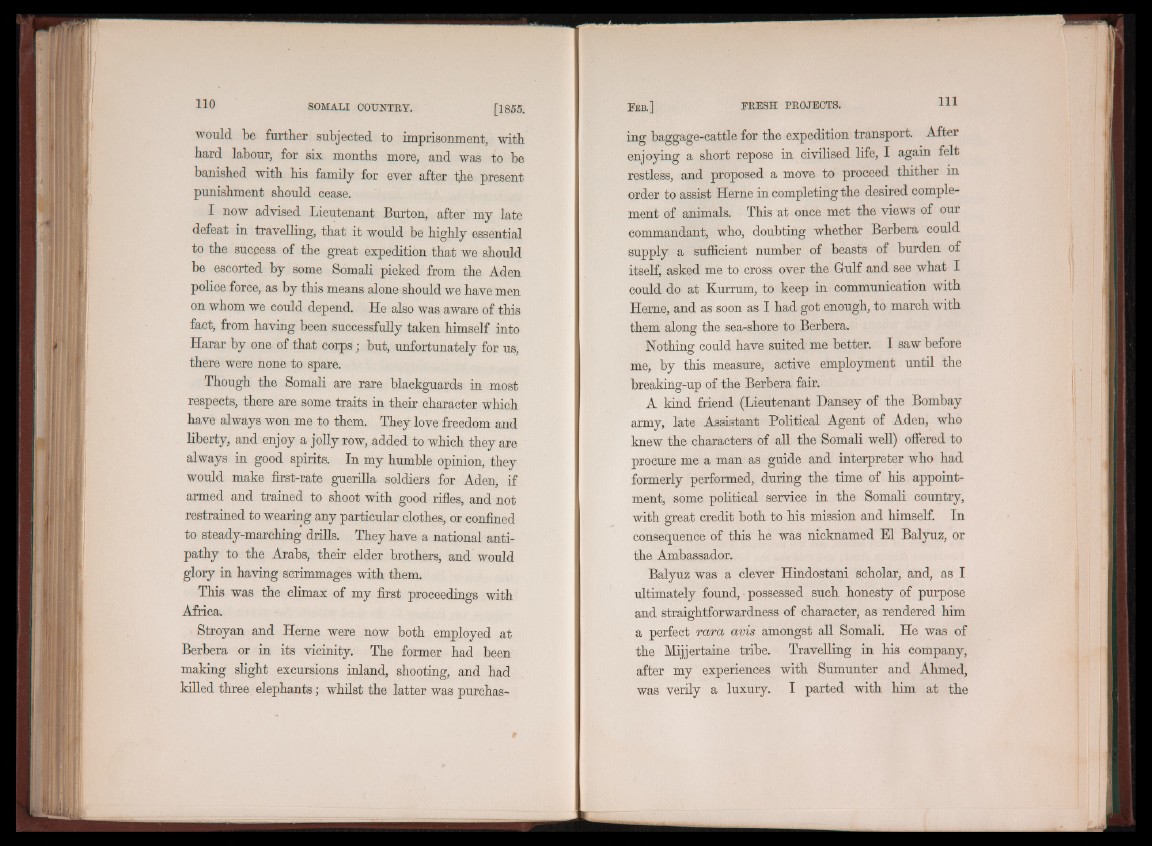
would be further subjected to imprisonment, with
hard labour, for six months more, and was to be
banished with his family for ever after the present
punishment should cease.
I now advised Lieutenant Burton, after my late
defeat in travelling, that it would be highly essential
to the success of the great expedition that we should
be escorted by some Somali picked from the Aden
police force, as by this means alone should we have men
on whom we could depend. He also was aware of this
fact, from having been successfully taken himself into
Harar by one of that corps; but, unfortunately for us,
there were none to spare.
Though the Somali are rare blackguards in most
respects, there are some traits in their character which
have always won me to them. They love freedom and
liberty, and enjoy a jolly row, added to which they are
always in good spirits. In my humble opinion, they
would make first-rate guerilla soldiers for Aden, if
armed and trained to shoot with good rifles, and not
restrained to wearing any particular clothes, or confined
to steady-marching drills. They have a national antipathy
to the Arabs, their elder brothers, and would
glory in having scrimmages with them.
This was the climax of my first proceedings with
Africa.
Stroyan and Herne were now both employed at
Berbera or in its vicinity. The former had been
making slight excursions inland, shooting, and had
killed three elephants j whilst the latter was purchasing
baggage-cattle for the expedition transport. After
enjoying a short repose in civilised life, I again felt
restless, and proposed a move to proceed thither in
order to assist Herne in completing the desired complement
of animals. This at once met the views of our
commandant, who, doubting whether Berbera could
supply a sufficient number of beasts of burden of
itself, asked me to cross over the Gulf and see what I
could do at Kurrum, to keep in communication with
Heme, and as soon as I had got enough, to march with
them along the sea-shore to Berbera.
Nothing could have suited me better. I saw before
me, by this measure, active employment until the
breaking-up of the Berbera fair.
A kind friend (Lieutenant Dansey of the Bombay
army, late Assistant Political Agent of Aden, who
knew the characters of all the Somali well) offered to
procure me a man as guide and interpreter who had
formerly performed, during the time of his appointment,
some political service in the Somali country,
with great credit both to his mission and himself. In
consequence of this he was nicknamed El Balyuz, or
the Ambassador.
Balyuz was a clever Hindostani scholar, and, as I
ultimately found, possessed such honesty of purpose
and straightforwardness of character, as rendered him
a perfect rara avis amongst all Somali. He was of
the Mijjertaine tribe. Travelling in his company,
after my experiences with Sumunter and Ahmed,
was verily a luxury. I parted with him at the